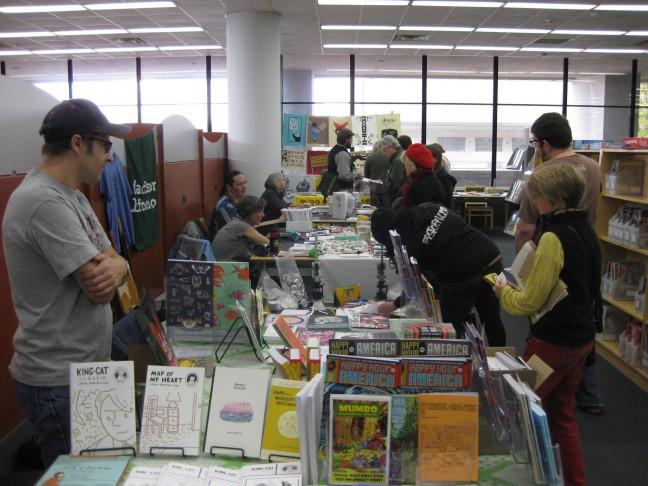“Print is dead!” the University of Wisconsin journalism professors constantly remind students.
On Saturday Oct. 19, I strolled over to Helen C. White Hall to prove those professors wrong and experience Madison Print & Resist, a festival of grassroot zines, political print and experimental publications organized by the Rainbow Bookstore Cooperative. The festival was filled with calm and quiet liberal types with an East Side mentality and an appreciation for the artistically experimental.
My first stop was at the Wisconsin Books to Prisoners table, where I meet Brigitte Fielder, an associate English lecturer at UW. She said the nonprofit provides books for correctional facilities across Wisconsin so prisoners can pursue reading as a means of knowledge and self-education. This drive combats the antiquated condition of prison library resources. Case in point: the most commonly requested items in prisons are dictionaries, where there is a wait list to use them in many prisons. This project is further complicated by prisons themselves, which reject any donated books with handwriting, highlighting or hardcovers. I grabbed some literature and walked away, vowing to donate some of my books.
Across the room, there was a table with blocky art prints and postcards with a sign proclaiming, “Art for Social Justice.” This was the vendor for Ricardo Levins Morales, an activist/artist out of Minneapolis. I spoke with his assistant, Jaime, who said Morales makes a majority of his profits selling art in bulk to unions and other labor organizations. All pieces are made in-studio by using scratchboard to create images, altering those images digitally and laser printing the results.
I walked to a corner stand with large and intricate posters on the wall behind and on the table. It was the Justseeds Artists’ Cooperative. Spread all over North America, they have a unique business model: every artist goes to regional events to sell other artists’ works and publicize their website store. My favorite print was of a bicyclist towing a tiny Victorian house —a surreal image. I cursed myself for not bringing cash and took three free, violently-colored stickers to desecrate my laptop instead.
At the next vendor, a friendly man cut and pasted together a collage complete with a girl with a snake for a mustache. He introduced himself as Andy Gricevich, a local experimental poet who has organized many local poetry events and a tiny press called “Cannot Exist.” It’s so tiny, in fact, that he binds the books himself, but usually with help.
“You invite friends over, drink some, and you all go to work with a bone folder; when the last few get sloppy, you know it’s time to stop,” Gricevich said.
I wrote two random words in a journal on display, as part of an ongoing project, and stopped to read part of his friend’s eight-foot poetry scroll. I did not make it all the way through.
People swarmed around other tables, admiring the more surreal artistic pieces. In a quiet, less-crowded corner, there was a journal of long-form cultural criticism called “The Baffler,” published in Cambridge, Mass. I flipped through one of the nearly 200-page magazines and admired how the art and literary forms pull their weight. I spoke with Patrick JB Flynn, its graphic designer, formerly of “The Progressive.” He emphasized the need to leave artists to their talents without changing too much of the content. His table mate, Michael Duffey, a Baffler contributor, agreed.
Perhaps in matters of form, content and artistic expression, print is alive and well.


